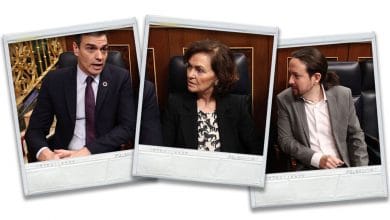
None of the Democrats has a strategy for ISIS
 Bernie Sanders, Hillary Clinton, and Martin O’Malley onstage Saturday, in Des Moines, Iowa. CREDIT PHOTOGRAPH BY JIM YOUNG / REUTERS VIA LANDOV
Bernie Sanders, Hillary Clinton, and Martin O’Malley onstage Saturday, in Des Moines, Iowa. CREDIT PHOTOGRAPH BY JIM YOUNG / REUTERS VIA LANDOV
Bernie Sanders was a sixties radical who applied for conscientious-objector status during the Vietnam War, because he was, according to a statement from his campaign spokesman earlier this year, “a pacifist.”
So on Saturday night, at the Democratic debate, in Des Moines, Iowa, it was jarring to hear Sanders, the first Presidential candidate to speak before a national audience in the aftermath of the Paris attacks, declare forthrightly, “Together, leading the world, this country will rid our planet of this barbarous organization called ISIS.”
If you tuned into the event still dumbstruck by the events in France but hoping the debate would offer some clarity about how the United States should respond, Sanders’s unambiguous call for a military defeat of ISIS was promising. Clearly he had thought about this vexing issue and came to the Iowa debate prepared to explain his strategy.
But in the next breath, he revealed he actually had no plan. “I’m running for President, because as I go around this nation, I talk to a lot of people,” he said, in a confusing and bizarre non sequitur. “And what I hear is people’s concern that the economy we have is a rigged economy. People are working longer hours for lower wages, and almost all of the new income and wealth goes to the top one per cent.”
Next up was Hillary Clinton, and she, too, promised to explain how she would deal with ISIS. “I will be laying out, in detail, what I think we need to do with our friends and allies in Europe and elsewhere to do a better job of coördinating efforts against the scourge of terrorism,” she said. “Our country deserves no less, because all of the other issues we want to deal with depend upon us being secure and strong.”
You can’t get any more direct than that: she would be “laying out in detail” the whole plan. Shortly after, she added a Sanderseque promise that ISIS “cannot be contained, it must be defeated,” which would be a notable shift from simply preventing ISIS’s expansion to eradicating it. But after two hours of debate, the Clinton plan never came.
The same was true of Martin O’Malley. He argued that ISIS represented “the new sort of challenge, the new sort of threat that does, in fact, require new thinking, fresh approaches and new leadership,” and yet he never told us exactly what that new thinking and those fresh approaches would be.
That’s not to say that there wasn’t some debate about the issue. But even those moments that seemed to highlight a difference of opinion fizzled into agreement about platitudes. At one point Clinton argued “this cannot be an American fight,” and O’Malley retorted, “This actually is America’s fight,” though he quickly added that “it cannot solely be America’s fight.” Got that?
There was a great deal of time spent on what caused ISIS’s rise. Sanders pointed to the effects of climate change. O’Malley and Sanders both pointed to Clinton’s vote in favor of the war in Iraq, which created the vacuum that ISIS has filled. John Dickerson, the moderator, asked whether Clinton’s support for deposing Muammar Qaddafi in Libya also contributed to the massive instability in the region. Clinton herself, in a creative stroke of deflection of responsibility for her role in the events of the last twelve years, argued that terrorism is simply a long-running problem in that part of the world.
“I think it’s important we put this in historic context,” Clinton said, before taking viewers back through the history of terrorist attacks against Americans, including the 1983 bombing of a Marine barracks in Beirut, the 1998 embassy attacks in Tanzania and Kenya, and 9/11. She was perhaps trying to show off her knowledge of the region and its history, but it seemed more like she was trying to avoid criticism that the invasion of Iraq and intervention in Libya helped fuel ISIS’s rise.
Some of the explanation for the lack of detail from Sanders, Clinton, and O’Malley has to do with the state of the Democratic primary race right now. As extreme underdogs, Sanders and O’Malley had incentives to attack Clinton’s record on Iraq and Libya, but they have little reason to lay out a comprehensive strategy, especially when appealing to a Democratic electorate that is wary of any military intervention that could produce high casualties for Americans. (There is no significant opposition to Obama’s counterterrorism drone war or his air strikes against ISIS in Syria and Iraq.)
Clinton may have been even more constrained in her responses. Sitting on an enormous lead, she was loath to say anything that might cause a reaction from the anti-war Democratic base that Obama tapped in 2008 to beat her. But aside from the obvious politics, she may have believed her caution was the more responsible course. She might not want to box in Obama, who has yet to settle on a new course against ISIS, by laying out her own more ambitious and detailed plan. And given her dominance in the race so far, she may not have wanted to box in the next President, either.
